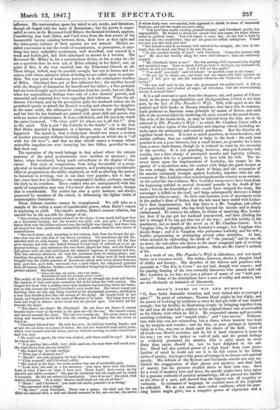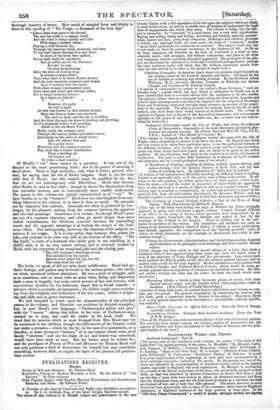HOOD'S POEMS Or WIT AND HUMOUR.
"0, thou hadst damnable iteration, and wert indeed able to corrupt a saint!" In point of substance, Thomas Hood might be but slight, and his power of evolving by incidents a story he had got hold of was limited enough ; but his fertility in illustrating a topic by bringing together front far and near all that had a relation to the original theme was as unrivalled as the felicity with which he did it. He suspended canons and proverbs touching overdoing, and " nequid nimis," and "esto brevis." Elabora- tion with him was not exhaustion, but a chace, where interest was kept up by surprise and wonder ; and the idea, as poor perhaps in intrinsic value as a fox, was run to death amid the cheers of the field. Cant of all kinds was Hood's aversion, and he hit it hard whenever it came in his way; yet was his nature so void of gall, and the genial feelings so evidently prompted his attacks, that a saint must be more flinty than saints should be, not to have delighted in his sal- lies. Hood had also poetical power of a high kind : from some pecu- liarities of mind he could not use it to its full extent in the loftier styles of poetry, but it gave him great advantage in burlesque and satirical parody. His ridicule of the Byronic and Germanic schools not only ex- hibited the exaggeration of their gloom and mystery, and their lack of matter, but his pictures rivalled theirs in their own way. Save for a word of mockery here and there, his parody might have been taken for a genuine outburst of poetical misanthropy, till he pierced the bladder at the close of a part, and showed that the bigness was all turgidity or verbosity. In command of language, he excelled most of the originals he ridiculed. We do not mean mere verbal readiness, which his pun- ning habits might give; but a complete power of expression and a
thorough mastery of metre. How much of mingled force and felicity is
there in this opening of "The Forge; a Romance of the Iron Age."
"Like a dead man genets his shroud,
The sun has sunk in a coppery cloud, And the wind is rising squally and loud
With many a stormy token;
Playing a wild funereal air, Through the branches bleak, bereaved, and bare, To the dead leaves dancing here and there:
In short, if the truth were spoken,
It's an ugly night for anywhere, But an awful one for the Brocken !
For oh ! to stop On that mountain-top, After the dews of evening drop, Is always a dreary frolic: Then what must it be when Nature groans, And the very mountain murmurs and moans As if it writhed with the cholic: With other strange supernatural tones, From wood and water and echoing stones,
Not to forget unburied bones—
ins region so diabolic!
However, it's quite As wild a night As ever was known on that sinister height, Since the Demon-dance was morriced.
The earth is dark, and the sky is scowling, And the blast through the pines is howling and growling, AS if a thousand wolves were prowling About in the old Black korest !
Madly, sadly, the tempest raves Through the narrow gullies and hollow caves, And bursts on the rocks in windy waves,
Like the billows that roar On a gusty shore
Mourning over the mariners' graves; Nay, more like a frantic lamentation From a howling set Of demons met To wake a dead relation."
Of Hood's " wit " there cannot be a question. It was not of the deepest or the most penetrating kind ; but in the power of amusing it Mood alone. There is high authority, and, what is better, general con- sent, for saying that the wit of Butler fatigues. Such is not the case with that of Hood ; but this remark must be qualified by the fact that we are not contemporary with Hudibras. Hood may become what Butler is, and in less time; though he draws his illustrations from less recondite sources, and is consequently more readily understood. The poems in this volume are rightly characterized as of "wit." We have doubts as to the "humour." Hood does not raise laughter from any- thing inherent in his subject, or at least he does so rarely. He succeeds not by character but contrast. Generally the effect is produced by bur- lesque, by the pleasure arising from the contrast between the apparent and the real meanings. Sometimes it is verbal ; for though Hood's puns are not of a common character, and often go much deeper than mere verbal resemblances, the felicitous contrast between the resembling words and the opposite meanings is at bottom the source of the ludi- crous effect. Not unfrequently, however, the elements of his subjects are serious, if not tragic. It is levity rather than humour that points the joke, and contrast is in some way still at the bottom of the effect. "The Sea-Spell," a story of a boatman who rashly goes to sea confiding in a child's cau], is in its own nature serious, and is seriously treated by Hood, with the exception of an occasional joke and the closing pun. "The jolly boatman's drowning scream Was smother'd by the squall; Heaven never beard his cry, nor did The ocean heed his caul."
The levity we speak of did not arise from indifference. Hood had pa- thetic feelings, and pathos may be found in his serious poems; but rarely, we think, sustained without admixture. He was a kind of struggle, such as i8 sometimes said to occur with an actor when liking and disposition leads a man to tragedy, but some secret powers of face and fortune, with unconscious faculties for the ludicrous, impel him to broad comedy : a mixture which is probably advantageous ; the hidden tragic sense restrain- ing from the vulgarity and buffoonery of the low comic, whilst it height- ens and adds zest to grave burlesque.
We had intended to touch upon the characteristics of the principal poems in the volume, and illustrate our positions by detailed examples ; but, in poor Hood's own language, "Parliamentary jabber and jaw," with the " season " claims that follow in the wake of Parliament-men, compel us to stop, and send the reader to the book itself. We trust that the pension which so soon dropped from Mrs. Hood may yet be continued to her children, though the chill reserve of the Premier could not make a promise,—which by the by, in the case of a commission, or a benefice, or some trumpery" honour," or in any matter where some good family " interests " and not the claim of art and letters was concerned, would have been made at once. But the future must be waited for; and the purchaser of Poems of Wit and Humour by Thomas Hood will not only purchase a fund of amusement for himself, but may contribute something, however little, to supply the lapse of the pension till pension- time arrives.
•



























 Previous page
Previous page